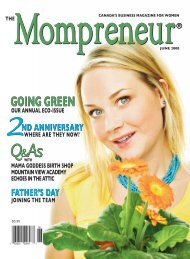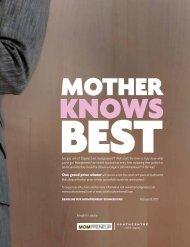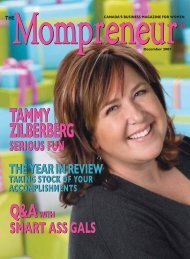kirstie McLellan Day kirstie McLellan Day - The MOMpreneur
kirstie McLellan Day kirstie McLellan Day - The MOMpreneur
kirstie McLellan Day kirstie McLellan Day - The MOMpreneur
You also want an ePaper? Increase the reach of your titles
YUMPU automatically turns print PDFs into web optimized ePapers that Google loves.
legal issues<br />
Looking at Legalities<br />
Licenses, patents, trademarks…<br />
and other legal issues entrepreneurs face<br />
By Cindy Stephen<br />
You’ve got a great product and a fantastic new idea.<br />
However, there’s a lot of red tape to unravel while<br />
rolling out your new business. You may even feel so<br />
strangled by complicated paperwork or confusing<br />
rules that you can’t move forward. If you anticipate<br />
the formalities and educate yourself in advance of the<br />
inevitable legal matters, the red tape won’t seem so<br />
sticky.<br />
<strong>The</strong>re are three basic elements when it comes to the legalities<br />
of either launching a new business or jumping to the<br />
next level. We’ve checked with experts across the country<br />
to give you the heads up; however, it’s always wise to seek<br />
counsel yourself.<br />
Licenses: open for business<br />
Most businesses need a license to operate legally within the<br />
local municipality. Some businesses, such as pharmaceutical<br />
companies or broadcast outlets, need a federal permit as<br />
well. Be prepared to do some research to determine what,<br />
precisely, is required.<br />
Industry Canada has developed an online tool, available in<br />
most provinces and territories in the country, to help small<br />
business owners find the appropriate requirements for each<br />
level of government in their area.<br />
BizPal generates a personalized list of the documents you<br />
need to complete. A question and answer “wizard” will walk<br />
you through the steps, saving you invaluable time on research<br />
and navigation through the dizzying levels of government.<br />
<strong>The</strong> City of Hamilton, Ont. implemented BizPal in 2009 to<br />
improve service for small business entrepreneurs.<br />
“It’s quite user friendly. It takes about 15 minutes to answer<br />
the questions and then it will spit out what types of permits<br />
you might need based on your answers,” says City of<br />
Hamilton Communications Officer Debbie Spence. She says<br />
BizPal will help business owners with other permits issues<br />
such as zoning verification, fire and public health permits<br />
and home-occupied business requirements.<br />
Most municipalities have websites with information on how<br />
to obtain business licenses. Otherwise, information can be<br />
found in the blue pages of your local phone directory.<br />
Protect and preserve<br />
If you have invented a never-before seen product or formula,<br />
you might already be in line at the patent office.<br />
“A patent is a time limited, monopoly right,” says intellectual<br />
property lawyer Jennifer Marles of Vancouver. “You get an<br />
exclusive right to make and sell your invention for 20 years<br />
from the date you file your application. At the end of that time<br />
period, the public is free to make and use your invention.”<br />
If you’re still thinking about whether to go down that<br />
road, it is imperative that you don’t show your fabulous<br />
new invention to the world. A patent is granted for a new,<br />
never-before-seen product that is also useful and inventive.<br />
However, once offered for sale or disclosed publicly, it is no<br />
longer considered to be new.<br />
<strong>The</strong> benefit of taking out a patent is that others can’t steal<br />
your idea or copy your invention – at least, not easily. <strong>The</strong><br />
drawback is that preparing and filing a patent application<br />
with the Canadian federal government, with professional<br />
assistance, costs at least $10,000 to $15,000 and success is<br />
not guaranteed. If the government has some objections to<br />
your application, you may incur more costs. Marles says new<br />
entrepreneurs should be very confident that their product is<br />
new, inventive and useful – not just an obvious modification<br />
of something already on the market – and that it will sell like<br />
hotcakes.<br />
“You’ve got a very large upfront investment that you may not<br />
recoup,” she advises. “Weigh your options, but do it before<br />
public disclosure.”<br />
An alternative to a patent<br />
may be an industrial design<br />
registration. This would<br />
protect the visual features<br />
of a product such as the<br />
shape of a flower vase or the<br />
treads of a tire. Registering<br />
an original design protects<br />
the visual features but not<br />
the mechanism or the way it<br />
Jennifer Marles, intellectual<br />
property lawyer and trademark<br />
and patent agent<br />
34 <strong>MOMpreneur</strong> ® � July/August 2010<br />
photo courtesy of Oyen Wiggs Green & Mutala LLP
















